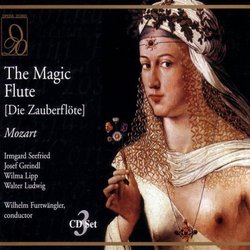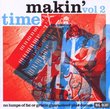| All Artists: Wolfgang Amadeus Mozart, Wilhelm Furtwängler, Vienna Philharmonic Orchestra, Edith Oravez, Elisabeth Höngen, Gertrud Grob-Prandl, Hermann Gallos, Irmgard Seefried, Josef Greindl, Karl Donch, Karl Schmitt-Walter, Paul Schöffler, Peter Klein, Sieglinde Wagner, Walther Ludwig, Wilma Lipp Title: Mozart: The Magic Flute (Die Zauberflöte) Members Wishing: 0 Total Copies: 0 Label: Opera D'oro Release Date: 6/3/2003 Genre: Classical Styles: Opera & Classical Vocal, Historical Periods, Classical (c.1770-1830), Modern, 20th, & 21st Century Number of Discs: 3 SwapaCD Credits: 3 UPC: 723724553729 |
Search - Wolfgang Amadeus Mozart, Wilhelm Furtwängler, Vienna Philharmonic Orchestra :: Mozart: The Magic Flute (Die Zauberflöte)
 | Wolfgang Amadeus Mozart, Wilhelm Furtwängler, Vienna Philharmonic Orchestra Mozart: The Magic Flute (Die Zauberflöte) Genre: Classical
|
Larger Image |
CD DetailsSimilar CDs
|
CD ReviewsAn awesome, all-star performance (and I do mean ALL-star) Theodore Shulman | NYC | 05/08/2007 (5 out of 5 stars) "Other reviewers have criticised the sound quality, and they're right, it's pretty awful, but the performance is so great I must give five stars anyway. Three of the central parts: Sarastro, Pamina, and the Queen of the Night, are played by singers who later made several other famous recordings. All three are singing here at the peak of their powers, already seasoned, but not yet bored with their roles. Josef Greindl especially sings with surprising passion; some of his later studio work was very much more restrained. You get to hear him speak, as well as sing, and his spoken address to the priests at the beginning of Act II is worth the price of admission alone. The funny sections are conducted a little too heavily for my taste. But Karl Schmitt-Walter is great in the spoken parts. All the secondary roles in this performance are sung by current or future superstars. Gertrud Grob-Prandl, the mighty Wagner-soprano famous as the leading Brunhilde, Isolde, and Turendot of her day, appears as the first of the three ladies, with a penetrating sound that occasionally threatens to dominate her ensembles, but is usually well under control. Although she sings with maybe twenty percent of her natural volume, you can hear the steely colors and the tight, rapid vibrato. But she also yields, gallantly, to her trio, producing a nicely blended sound. Unlike other big Wagnerian sopranos such as Birgit Nilsson, Grob-Prandl has no problem with the pitch and dexterity necessary for Mozart. She and the other ladies deal very well with the Ladies' fundamental paradox, which is, they must sound beautiful but also creepy. Two future heroic legends, Ernst Haeflinger and Hermann Uhde, play the two Geharnischters. And Paul Schoffler, whose name soon became synonymous with Hans Sachs, plays the Sprecher. Peter Klein, who later achieved the rank of "Kammersanger", sings Monostatos with a distinctive nasal tone. This is the best of Irmgard Seefried's many recorded Paminas I've heard: young, silvery, and fully engaged. Walther Ludwig's Tamino is also unassailable: free, intelligent, modest, and elegant, and more human-sounding than Fritz Wunderlich. Furtwangler's conducting, while heavy, is very sensitive to the text. He's not afraid to employ subtle changes in tempo from phrase to phrase. This makes this a difficult recording to sing along with but most absorbing to listen to. One other point: If you happen to be a teacher of German, the cast in this performance is almost entirely German. You can teach native-like intonation and elocution with it. " Recorded on cassette from a balcony railing Douglas Vanderweide | Maine, USA | 11/01/2008 (1 out of 5 stars) "I've never been more disappointed with a recording or a shopping experience than this one. That Amazon sells a recording of this low quality is unfathomable. That they do so under a no-refunds policy is unconscionable. It sounds as if most of this album was recorded on a cassette player placed along a balcony railing. I understand this recording is noteworthy for the performers, and initially subject to the recording technology of the time: but if anything was ever in need of remastering, it's this. The previews give little hint of how terrible the MP3s sound on a high-end audio system. Played through either iTunes or WinAmp, they're all tape hiss and washed-out, mid-range noise. No amount of messing around with equalizers or settings will fix the mess. Surely, Amazon could have found a better recording (e.g., one from Deutsche Grammophon) or, again, insisted on remastering before agreeing to sell this one. Pride would dictate that, or at the very least noting the year and technical details of this recording (rather than just the 2003 release date). Or, better yet, not selling this album at all. A no-refunds, no-returns policy for digital downloads is understandable. But if that's Amazon's policy, they can't sell garbage. And that's what this recording is: pure and simple offal. I will never again purchase digital content from Amazon, thanks to this terrible experience. If they're going to sell chaff, and their previews aren't going to help me sort it from the wheat they should be selling, then I've learned my lesson." Good conducting, mediocre singing, poor sound, look elsewher Philip S. Griffey | Bainbridge I. WA USA | 07/06/2008 (2 out of 5 stars) "This recording is a well conducted performance in mediocre sound; it was a live performance broadcast from Salzburg on July 27, 1949. Furtwangler brings little or none of the magic of his Beethoven to the Mozart. Most of the singing is undistinguished. The better singers (Lipp and Seefried) can be heard elsewhere to better effect.
If you want every Furtwangler recording, this is one. There is another Furtwangler Flute on EMI. I have not heard it, but with Dermota and Kunz in the male roles, and the same women in the female roles, it should be head and shoulders above this performance. " |

 Track Listings (8) - Disc #1
Track Listings (8) - Disc #1
